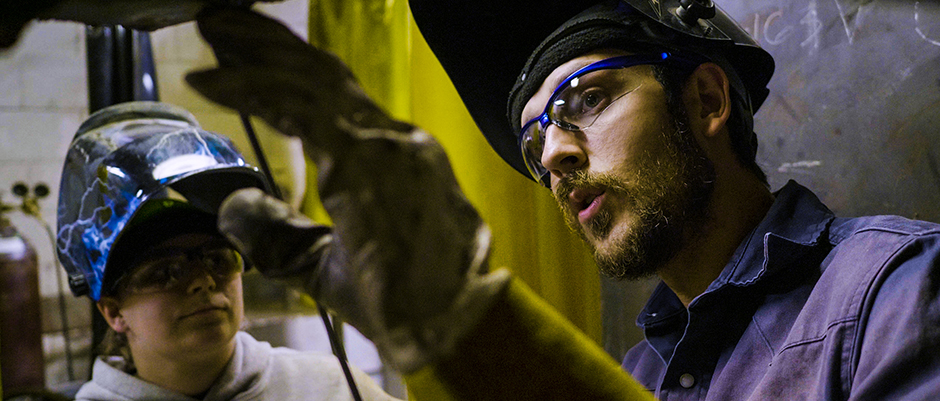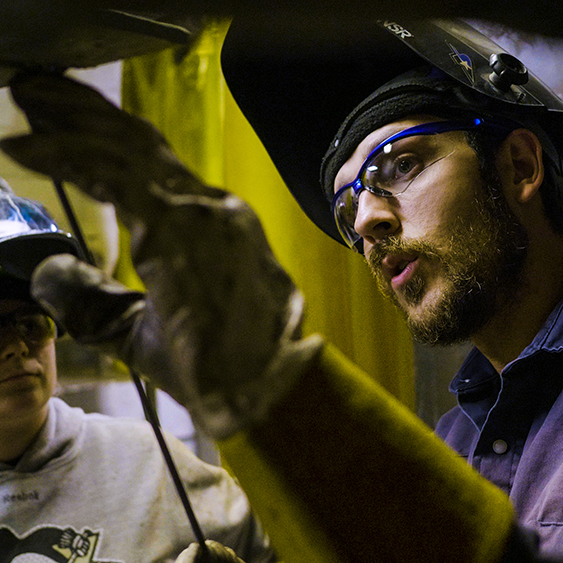
A welder is a mechanical trades worker who joins and cuts metal parts by applying heat. This is done with either hand-held or remotely controlled welding machines. Welders also fill holes, fix indentations, or smooth out seams in metal products.[1] Welders can usually apply their skills to many different sectors, making it easy for them to switch from one industry to another. If a welder is willing to travel, they can simply go where they’re needed the most.[2]
Are you interested in a career that allows you to work with your hands and build things? If so, you might be wondering if welding is the right choice for you.
Why welding is a good career:
No college degree required
Undergraduate degree programs at colleges typically take four years, and many students face a big student loan burden upon graduation.[3] Besides, not every person wants to spend four years (or more) sitting in classrooms, studying for exams, and writing papers. Welding doesn’t require a college degree. Welders-to-be typically just need a high school diploma or equivalent, along with a certificate or degree from a postsecondary welding training program.
Short training
Welding training programs can be completed in much less time than a four-year undergraduate degree program. Training options include vocational schools, community colleges, apprenticeships, and on-the-job training.[4]Vocational school, on-the-job training, and certificate programs at community colleges usually take several months. Associate degree programs at community colleges and apprenticeships can last up to a few years. Delta Tech’s Welding Program can be completed in seven months.
Working with hands
Holding down a nine-to-five office job isn’t ideal for everybody. Some people enjoy working with their hands, creating things, and being both indoors and outdoors. If this applies to you, welding might be a great choice for you.Welders work on buildings, structures, cars, aircrafts, and pipes, among other things. They work indoors, like in a factory, as well as outdoors, such as on shipyards.[5] Learn more about what a welder does here.
Sense of accomplishment
As a welder, you can immediately see the fruit of your labor, so to speak. Whether you’re contributing to the construction of a bridge or creating the body of a car, you can follow the progress of your work and later see the finished product. Imagine, for example, walking down a street and looking at a skyscraper that you helped build.
Shortage in qualified skilled workers
There is a skilled labor shortage in the United States, which is plaguing the construction industry in particular. According to the American Welding Society (AWS), the average age of a welding operator is 57. With members of the baby boomer cohort set to retire, employers are in need of a new generation of qualified welders. The demand for welders is especially strong in infrastructure-, energy-, and transportation construction.[6]
Booming industries employing welders
As the country’s infrastructure is aging, welders are needed to help repair and rebuild bridges, highways, and buildings. New jobs may also open up in the construction of new power generation facilities and pipelines transporting natural gas and oil.[7] Airport and public education construction is expected to experience an uptick as well.[8]
Versatility and flexibility
The essential skills and techniques that a welder uses are largely the same across different industries. If one sector isn’t fairing too well, welders may be able to find a job in another. Say, the car manufacturing industry is experiencing a downturn, you can try and find a job in the field of energy generation. Some welders may also get the chance to travel, like traveling industrial pipe welders or military support welders.[9]
Career advancement potential
With continued education, welders can also move into positions with greater responsibilities. You typically need additional, specialized training, as well as particular certifications to qualify for these jobs. Examples include arc welding specialist, welding inspector, or welding instructor.[10] Read more about how to long it takes to become a welder here.
Opportunities for women
Welding might not sound like a traditional career for women, but the number of female welders is on the rise. Younger women are less restricted by conventional gender roles than women of older generations and are thus moving into male-dominated fields. Since employers all over the country are looking for qualified welders, women can also help fill the skilled trades gap.[11]
Why Become a Welder?
Welding is an exciting, hands-on career path, with opportunities for travel and career advancement. Welders have a hand in the country’s construction and production.You can learn more about the career path of a welder in Delta Tech’s “How to Become a Welder” guide.
SOURCES
-
[1] https://www.bls.gov/ooh/production/welders-cutters-solderers-and-brazers.htm#tab-2
[2] https://www.bls.gov/ooh/production/welders-cutters-solderers-and-brazers.htm#tab-6
[3] https://www.weldpedia.com/2017/12/is-welding-a-good-career-choice.html
[4] https://www.bls.gov/ooh/production/welders-cutters-solderers-and-brazers.htm#tab-4
[5] https://www.bls.gov/ooh/production/welders-cutters-solderers-and-brazers.htm#tab-3
[6] https://www.constructionequipment.com/solving-skilled-welder-shortage
[7] https://www.bls.gov/ooh/production/welders-cutters-solderers-and-brazers.htm#tab-6
[8] https://www.constructconnect.com/blog/construction-news/2018-construction-industry-economic-outlook/
[9] http://profoundlydisconnected.com/welding-is-a-100000-job/
[10] https://weldingcareernow.com/blog/welding-career-advancement
[11] https://www.constructionequipment.com/solving-skilled-welder-shortage



